七年级下英语语法专题_一般过去时
初一英语英语一般过去时知识点总结附答案
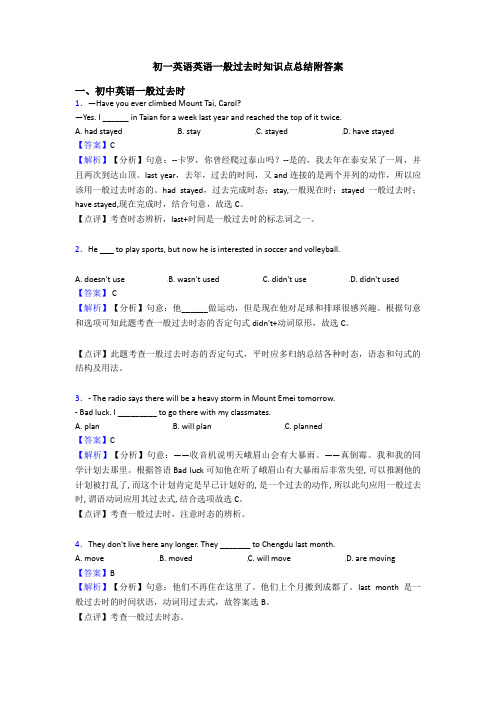
初一英语英语一般过去时知识点总结附答案一、初中英语一般过去时1.—Have you ever climbed Mount Tai, Carol?—Yes. I ______ in Taian for a week last year and reached the top of it twice.A. had stayedB. stayC. stayedD. have stayed【答案】C【解析】【分析】句意:--卡罗,你曾经爬过泰山吗?--是的,我去年在泰安呆了一周,并且两次到达山顶。
last year,去年,过去的时间,又and连接的是两个并列的动作,所以应该用一般过去时态的。
had stayed,过去完成时态;stay,一般现在时;stayed一般过去时;have stayed,现在完成时,结合句意,故选C。
【点评】考查时态辨析,last+时间是一般过去时的标志词之一。
2.He to play sports, but now he is interested in soccer and volleyball.A. doesn't useB. wasn't usedC. didn't useD. didn't used【答案】 C【解析】【分析】句意:他______做运动,但是现在他对足球和排球很感兴趣。
根据句意和选项可知此题考查一般过去时态的否定句式didn't+动词原形,故选C。
【点评】此题考查一般过去时态的否定句式,平时应多归纳总结各种时态,语态和句式的结构及用法。
3.- The radio says there will be a heavy storm in Mount Emei tomorrow.- Bad luck. I _________ to go there with my classmates.A. planB. will planC. planned【答案】C【解析】【分析】句意:——收音机说明天峨眉山会有大暴雨。
七年级下册一般过去时讲解及练习题

辅导科目:英语授课主题语法:一般过去时教学目标1、熟悉一般过去时的基本结构2、运用概念和结构去解题教学内容经典句型—How was your weekend?—Great,thanks.—What did you do last weekend?-I did my homework.Section A1。
表示“发生在过去的动作",要用一般过去时,句中常含表示“过去"的时间。
一般过去时的结构:主语+V过去式。
翻译时加上“…了”。
(不管主语是“单数”还是“复数”,动词始终用“过去式”)练:(1) He _________ (go)to school on foot yesterday。
(2)– What did Jim do?—— He _________ (go) to the movies。
(3)We ___________ (not go) to the cinema last Sunday。
2. –你上个周末做了什么?—— What did you do last weekend?(did引导,动词还原)——在星期天上午,我打了网球。
—- I played tennis on Sunday morning。
拓展:时间前的介词用什么在上午/下午/晚上:in the morning/afternoon/evening在星期天上午/下午/晚上:on Sunday morning/afternoon/evening在上个星期天上午: / last Sunday morning (前不用冠词)在上学的白天/晚上:on school days/nightson weekends 在周末on weekdays 在工作日3. –Tina的周末怎么样?-- How was Tina’s weekend?--它很棒:It was great。
–它还不错:It was not bad。
–它很糟糕:It was terrible。
Unit 6 语法一般过去时的肯定,否定和疑问句式(解析版) (牛津译林版)七年级英语下册
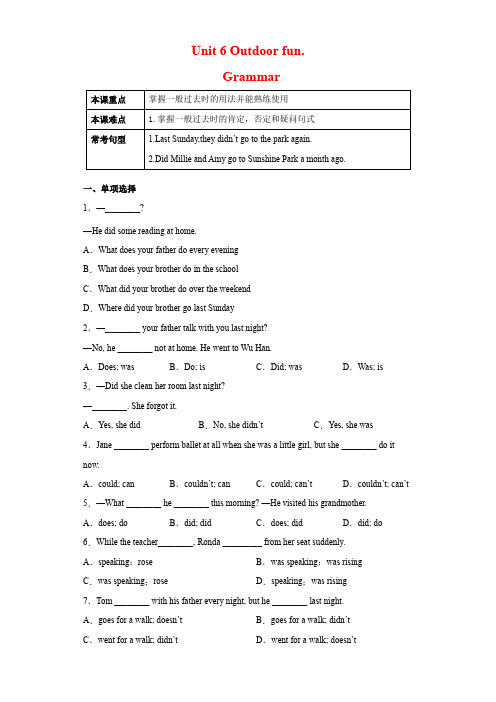
Unit 6 Outdoor fun.Grammar一、单项选择1.—________?—He did some reading at home.A.What does your father do every eveningB.What does your brother do in the schoolC.What did your brother do over the weekendD.Where did your brother go last Sunday2.—________ your father talk with you last night?—No, he ________ not at home. He went to Wu Han.A.Does; was B.Do; is C.Did; was D.Was; is 3.—Did she clean her room last night?—________. She forgot it.A.Yes, she did B.No, she didn’t C.Yes, she was 4.Jane ________ perform ballet at all when she was a little girl, but she ________ do it now.A.could; can B.couldn’t; can C.could; can’t D.couldn’t; can’t 5.—What ________ he ________ this morning? —He visited his grandmother. A.does; do B.did; did C.does; did D.did; do 6.While the teacher________, Ronda _________ from her seat suddenly. A.speaking;rose B.was speaking;was risingC.was speaking;rose D.speaking;was rising7.Tom ________ with his father every night, but he ________ last night.A.goes for a walk; doesn’t B.goes for a walk; didn’tC.went for a walk; didn’t D.went for a walk; doesn’t8.— ________ Carol ________ any photos in the park?—Yes, she did.A.Does; take B.Did; took C.Did; take 9.—Look at my new smart phone.—Wow. it’s so cool! When and where _________ you _________ it?A.do; buy B.have; bought C.did; buy 10.—You can’t swim in the river. It’s dangerous.—Sorry, I ________ see the sigh “No swimming”.A.don’t B.didn’t C.doesn’t D.won’t 11.— When ________ your father at work?— The day before yesterday.A.is B.did C.was12.________ your mother ________ a meeting last Friday?A.Does; have B.Did; have C.Did; has 13.—Did you visit the Great Wall last year?—________. But we visited the Palace Museum.A.Yes, we do B.No, we didn’t C.Yes, we did D.No, we don’t 14.—Where ________ you yesterday?—I was in the library.A.are B.were C.was D.be15.I ________ play in the park ________ I was a little girl. I really miss my happy days there.A.used to; after B.didn’t use to; when C.didn’t use to; after D.used to; when 16.—________ you study for the test last night?—Yes, and I studied very hard to get good grades this time.A.Do B.Did C.Are D.Does 17.—You can’t park your car here. Can’t you see the sign?—I am sorry. I _______ see it just now.A.won’t B.don’t C.didn’t D.wasn’t 18.—I ________ a good breakfast this morning.—Neither ________ I. Let’s go and buy some snacks.A.hadn’t; had B.didn’t have; had C.didn’t have; did D.hadn’t; did19.My sister _________ sing any English songs two years ago, but now she ________ do it very well.A.can’t; can B.couldn’t; can C.can’t; could D.couldn’t; could 20.—_______?—I camped by the lake with friends.A.How was your summer vacationB.Where do you goC.What did you do last weekend21.— Look at the sign , “No Photos”.— Sorry, I ________ see it.A.don’t B.didn’t C.can’t22.The People’s Park is ___________ I __________ her for the first time.A.where, meet B.when, met C.where, met D.when, meet 23.—Excuse me, what time ________ the concert ________?—Well, in fact you’re twenty minutes late. It ________ at eight o’clock sharp. A.did…begin; began B.does…begin; began C.did…begin; has begun D.does...begin; begins24.— ________ you ________ any better today, young lady?— Yes, thank you, Doctor Mason. It ________ as much as it ________ yesterday. A.Are...feeling; doesn’t hurt; did B.Are…feeling; hurts; hurt C.Do...feel; wasn’t hurt; hurt D.Do...feel; hurts; did25.—Mr. Green, ________ you ________ the Happy Valley last Sunday?—No, but I’ll visit it next week.A.will; go to B.did; went to C.did; go to D.did; gone to 26.—Did your friends and you hear what the guide said in the museum?—________. We were busy talking with each other at that time.A.Yes, we were B.No, we weren’t C.Yes, we did D.No, we didn’t 27.—________ you go to your grandparents’ home every weekend, Lucy?—Yes, and I ________ chickens there last weekend.A.Do; feed B.Do; fed C.Did; feed D.Did; fed 28.—My mother said you went on a Silk Road trip last year.—Yes, it ________ a wonderful trip.A.weren’t B.was C.will be D.were 29.—________ you stay at home last Sunday afternoon?—No, I ________ a kite with my friends in the park.A.Do; fly B.Were; flew C.Did; flew D.Did; fly 30.you to the park six hours ago?A.Did; went B.Did; go C.Will; go二、句型转换31.Mr. Wang went to Canada two years ago. (对画线部分提问)________ ________ Mr. Wang go to Canada ?32.Jim read a newspaper just now.(对划线处提问)________________ Jim read just now?33.My father had a fever last week. (对划线部分提问)________________________ last week?34.Their friend played on the playground the day before yesterday.(变为一般疑问句)________ their friend _______ on the playground the day before yesterday?35.The little boy often buys some flowers for his mother. (用上last Sunday,把句子改写为否定句)The little boy _________________ any flowers for his mother last Sunday.36.They went to Shanghai this morning. (改为一般疑问句)________ they ________ to Shanghai this morning?37.He went to the park last year. (改为否定句)He ________ ________ to the park last year?38.He did his homework at home last weekend.(改为否定句)He ________________ his homework at home last weekend.39.Lucy read English yesterday morning. (改为否定句)Lucy ________ ________ English yesterday morning.40.Mary went to London for a study trip last summer. (改为一般疑问句)________ Mary ________ to London for a study trip last summer?41.Bob did some exercise this morning. (改为一般疑问句)_______ Bob _______ any exercise this morning?42.The book cost him seven dollars. (改为一般疑问句)________ the book ________ him seven dollars?43.Nacy did her homework last night. (改为否定句)Nacy ____________ ____________ her homework last night.44.The new house cost Mr. Smith a lot of money.(改为否定句)The new house ________ ________ Mr. Smith much money.45.I felt tired after working for more than 10 hours yesterday. (改为否定句)I ___________ ___________ tired after working for more than 10 hours yesterday.参考答案:1.C【解析】句意:——你哥哥周末做了什么?——他在家看书。
Grammar七年级英语下册——一般过去时

语法精讲一般过去时(Ⅰ)1、一般过去时的基本定义一般过去时表示在过去某一时间发生的动作或存在的状态,也可以表示在过去某一阶段经常或反复发生的动作。
2、与一般过去时连用的时间状语yesterday(昨天),last week/month/year(上周/上个月/去年),two days/months ago(两天/两个月前),the day before yesterday(前天),in 2000(在2000年),in those days(在那些日子里),just now(刚才),a moment ago(刚才)等常与一般过去时连用。
3、一般过去时的句式结构(1)、含be动词的过去时的句式①肯定句:主语+was/were+其他.如:I was late for school yesterday morning.昨天早上我上学迟到了。
②否定句:主语+was/were+not+其他.如:The school trip wasn't interesting last week.上周的学校旅行不是很有趣。
③一般疑问句:Was/Were+主语+其他?肯定回答:Yes,主语+was/were.否定回答:No,主语+wasn't/weren't.如:—Were you late yesterday?你昨天迟到了吗?—Yes,I was./No,I wasn't.是的,我迟到了。
/不,我没有迟到。
(2)含实义动词的过去时的句式①肯定句:主语+动词过去式+其他.如:They had a good time yesterday.他们昨天玩得很开心。
②否定句:主语+did not(didn't)+动词原形+其他.如:They didn't watch TV last night.昨天晚上他们没有看电视。
③一般疑问句:Did+主语+动词原形+其他?肯定回答:Yes,主语+did.否定回答:No,主语+didn't.如:—Did you go to the park yesterday?昨天你去公园了吗?—Yes,I did./No,I didn't.是的,我去了,/不,我没去。
英语人教版七年级下册11单元一般过去式

• 注:just一般不用于否定形式!
3/7/2020
巧记动词过去时态
动词一般过去时,表示过去发生的事; be用was或用were, have, has变had; 谓语动词过去式,过去时间作标志; 一般动词加-ed,若是特殊得硬记。 否定句很简单,主语之后didn’t添; 疑问句也不难,did放在主语前; 如果谓语之前有did,谓语动词需还原; 动词若是was,were,否定就把not添。
1. look looked 2. live lived 3. stop stopped
4. carry carried 5. hope hoped 6. trip tripped
7. call called 8. finish finished 9. want wanted
10.are were 11.go went 12.have had
Sunday night Sunday afternoon Sunday morning
went to the beach played tennis went to the movies
Saturday afternoon
Saturday morning
Saturday night
A: What did you do last weekend? B: I …. A: What about your friend, …? B: She / He ….
否定句:☺主语+did+ not+动词原形+其他
e.g. He didn’t do morning exercises yesterday. I didn’t play basketball last week.
完整)初一下英语一般过去时
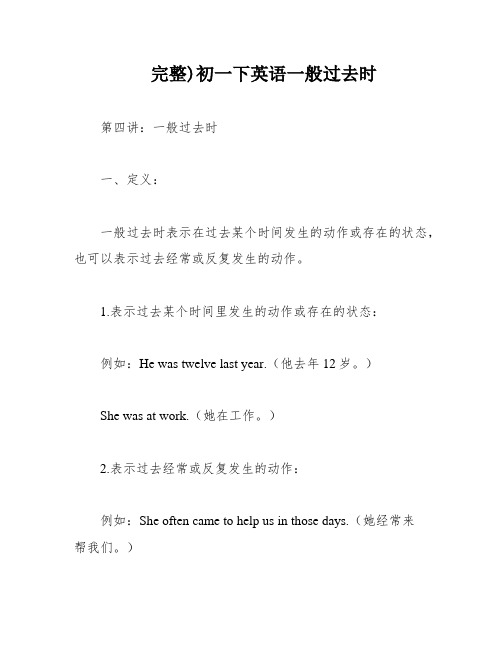
完整)初一下英语一般过去时第四讲:一般过去时一、定义:一般过去时表示在过去某个时间发生的动作或存在的状态,也可以表示过去经常或反复发生的动作。
1.表示过去某个时间里发生的动作或存在的状态:例如:He was twelve last year.(他去年12岁。
)She was at work.(她在工作。
)2.表示过去经常或反复发生的动作:例如:She often came to help us in those days.(她经常来帮我们。
)Mrs。
Peter always carried an umbrella.(彼得太太总是带着伞。
)二、常与一般过去时连用的词:1.时间状语ago(two hours ago(一段时间+ago)yesterday(morning。
afternoon。
evening)the day before yesterdaylast week。
last year。
last night。
last month…具体时间(如Jan。
fourth)just nowat the age of 10(过去时间段)one daylong agoonce upon a timethis morning(afternoon。
evening) long long ago(很久以前)the other day(前几天)at the moment三、一般过去时的构成1、系动词be的一般过去时构成:主语+be(was。
were)+其他主语是”I”时-----was主语为单数时-----was主语为复数及you时-----were否定句的构成:主语+be + not+其他was not = wasn’twere not = weren’t活学活用】填入适当的be动词。
1、Kitty was an English girl.(基蒂是一个英国女孩。
)2.Was it cold in your city yesterday?(昨天你们的城市冷吗?)3、I was not from Taizhou.(我不是来自台州。
仁爱版英语七年级下册Unit7Topic3一般过去时语法课说课稿
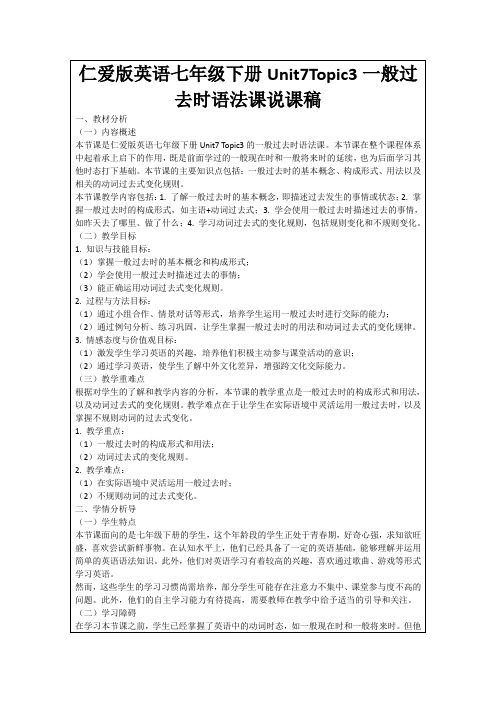
(二)学习障碍
在学习本节课之前,学生已经掌握了英语中的动词时态,如一般现在时和一般将来时。但他们可能对一般过去时的理解不够深入,容易与其他时态混淆。可能存在以下学习障碍:
2.实物和图片:展示与过去事件相关的实物和图片,帮助学生更好地理解一般过去时的应用场景。
3.互动白板:方便学生上台演示、互动,提高课堂参与度。
4.网络资源:提供丰富的在线学习资源,拓展学生的知识视野。
(三)互动方式
1.师生互动:通过提问、答疑、示范等方式,引导学生积极参与课堂,关注学生的学习状态,给予及时反馈。
(2)动词过去式的变化规则。
2.教学难点:
(1)在实际语境中灵活运用一般过去时;
(2)不规则动词的过去式变化。
二、学情分析导
(一)学生特点
本节课面向的是七年级下册的学生,这个年龄段的学生正处于青春期,好奇心强,求知欲旺盛,喜欢尝试新鲜事物。在认知水平上,他们已经具备了一定的英语基础,能够理解并运用简单的英语语法知识。此外,他们对英语学习有着较高的兴趣,喜欢通过歌曲、游戏等形式学习合作精神和自主学习能力。其理论依据为社会建构主义,认为学习是学生在社会互动中建构知识的过程。
(二)媒体资源
我将使用以下教具、多媒体资源和技术工具辅助教学:
1.多媒体课件:展示一般过去时的用法、动词过去式的变化规则等,形象生动地呈现教学内容,提高学生的学习兴趣。
1.对一般过去时的构成形式和用法理解不透彻;
2.动词过去式的变化规则掌握不牢固,尤其是不规则动词的过去式;
3.在实际语境中,难以灵活运用一般过去时进行表达。
七年级下册英语语法《一般过去时的用法》知识点整理
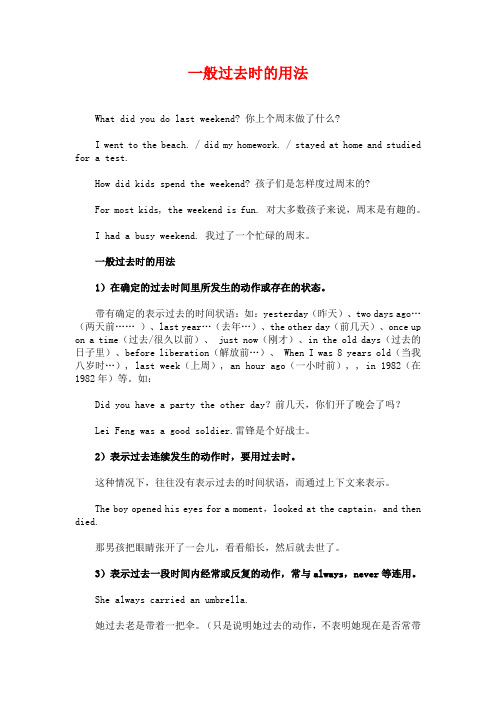
一般过去时的用法What did you do last weekend? 你上个周末做了什么?I went to the beach. / did my homework. / stayed at home and studied for a test.How did kids spend the weekend? 孩子们是怎样度过周末的?For most kids, the weekend is fun. 对大多数孩子来说,周末是有趣的。
I had a busy weekend. 我过了一个忙碌的周末。
一般过去时的用法1)在确定的过去时间里所发生的动作或存在的状态。
带有确定的表示过去的时间状语:如:yesterday(昨天)、two days ago…(两天前…… )、last year…(去年…)、the other day(前几天)、once up on a time(过去/很久以前)、 just now(刚才)、in the old days(过去的日子里)、before liberation(解放前…)、 When I was 8 years old(当我八岁时…), last week(上周), an hour ago(一小时前), , in 1982(在1982年)等。
如:Did you have a party the other day?前几天,你们开了晚会了吗?Lei Feng was a good soldier.雷锋是个好战士。
2)表示过去连续发生的动作时,要用过去时。
这种情况下,往往没有表示过去的时间状语,而通过上下文来表示。
The boy opened his eyes for a moment,looked at the captain,and then died.那男孩把眼睛张开了一会儿,看看船长,然后就去世了。
3)表示过去一段时间内经常或反复的动作,常与always,never等连用。
七年级下册英语语法《一般现在时和一般过去时的区别》知识点
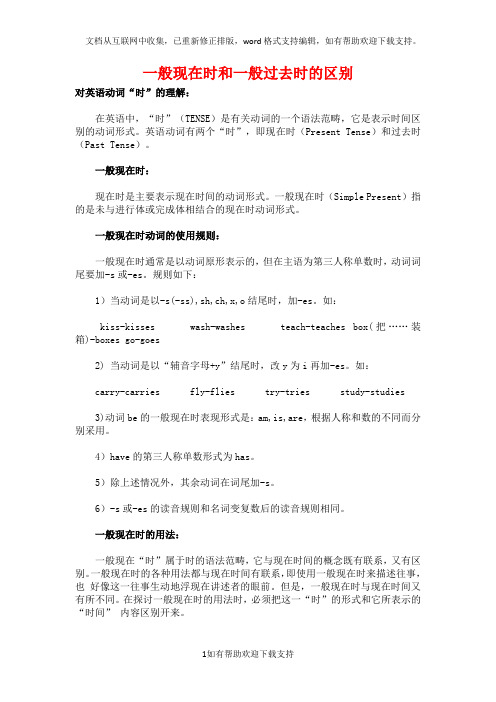
一般现在时和一般过去时的区别对英语动词“时”的理解:在英语中,“时”(TENSE)是有关动词的一个语法范畴,它是表示时间区别的动词形式。
英语动词有两个“时”,即现在时(Present Tense)和过去时(Past Tense)。
一般现在时:现在时是主要表示现在时间的动词形式。
一般现在时(Simple Present)指的是未与进行体或完成体相结合的现在时动词形式。
一般现在时动词的使用规则:一般现在时通常是以动词原形表示的,但在主语为第三人称单数时,动词词尾要加-s或-es。
规则如下:1)当动词是以-s(-ss),sh,ch,x,o结尾时,加-es。
如:kiss-kisses wash-washes teach-teaches box(把……装箱)-boxes go-goes2) 当动词是以“辅音字母+y”结尾时,改y为i再加-es。
如:carry-carries fly-flies try-tries study-studies3)动词be的一般现在时表现形式是:am,is,are,根据人称和数的不同而分别采用。
4)have的第三人称单数形式为has。
5)除上述情况外,其余动词在词尾加-s。
6)-s或-es的读音规则和名词变复数后的读音规则相同。
一般现在时的用法:一般现在“时”属于时的语法范畴,它与现在时间的概念既有联系,又有区别。
一般现在时的各种用法都与现在时间有联系,即使用一般现在时来描述往事,也好像这一往事生动地浮现在讲述者的眼前。
但是,一般现在时与现在时间又有所不同。
在探讨一般现在时的用法时,必须把这一“时”的形式和它所表示的“时间” 内容区别开来。
一般现在时即可用于动作动词,也可用于状态动词,而用于状态动词的居多。
1)表示不受时间限制的客观存在:这一用法多用于状态动词,也可用于动作动词,表示客观真理和科学事实、格言及其他没有时限的客观存在。
如:Twice two is four. 2的的两倍是4。
七年级下一般过去时复习课件

肯定回答:Yes, he did. 否定回答:No, he didn’t.
1.一般动词词尾加—ed
walk— walked
• 6. The students played football just now.(刚才) 否定句:
• 一般疑问句: • 肯定回答: • 否定回答:
• 划线提问:
• 6. The students played football just now.(刚才)
否定句:
• The students didn’t play football just now. • 一般疑问句: • Did the students play football just now? • 肯定回答:Yes, they did. • 否定回答:No, they didn’t. • 划线提问: • What did the students do just now?
• 8. He had an egg for breakfast this morning.
否定句:
• 一般疑问句: • 肯定回答: • 否定回答: • 划线提问:
He was at home yesterday. I got up at six thirty yesterday morning. I visited my aunt last weekend.
2、表示过去经常或反复发生的动作。
My father often went to work by bus last year. When I was a child, I often listened to music.
初一下一般过去时讲解及训练
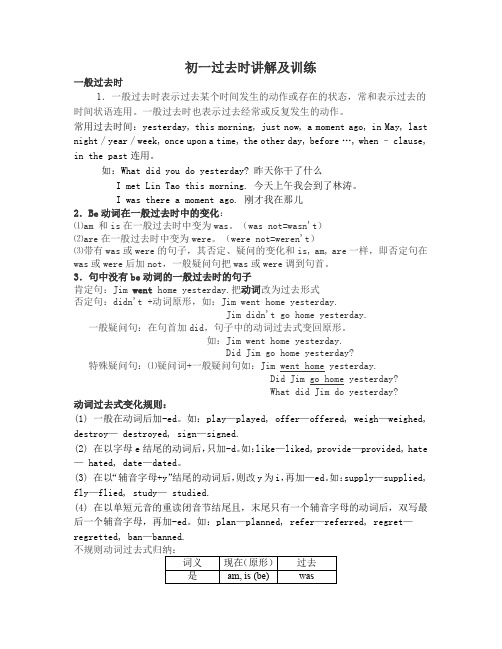
初一过去时讲解及训练一般过去时1.一般过去时表示过去某个时间发生的动作或存在的状态,常和表示过去的时间状语连用。
一般过去时也表示过去经常或反复发生的动作。
常用过去时间:yesterday, this morning, just now, a moment ago, in May, last night / year / week, once upon a time, the other day, before …, when –clause, in the past连用。
如:What did you do yesterday? 昨天你干了什么I met Lin Tao this morning. 今天上午我会到了林涛。
I was there a moment ago. 刚才我在那儿2.Be动词在一般过去时中的变化:⑴am 和is在一般过去时中变为was。
(was not=wasn't)⑵are在一般过去时中变为were。
(were not=weren't)⑶带有was或were的句子,其否定、疑问的变化和is, am, are一样,即否定句在was或were后加not,一般疑问句把was或were调到句首。
3.句中没有be动词的一般过去时的句子肯定句:Jim went home yesterday.把动词改为过去形式否定句:didn't +动词原形,如:Jim went home yesterday.Jim didn't go home yesterday.一般疑问句:在句首加did,句子中的动词过去式变回原形。
如:Jim went home yesterday.Did Jim go home yesterday?特殊疑问句:⑴疑问词+一般疑问句如:Jim went home yesterday.Did Jim go home yesterday?What did Jim do yesterday?动词过去式变化规则:(1) 一般在动词后加-ed。
英语人教版七年级下册一般过去式
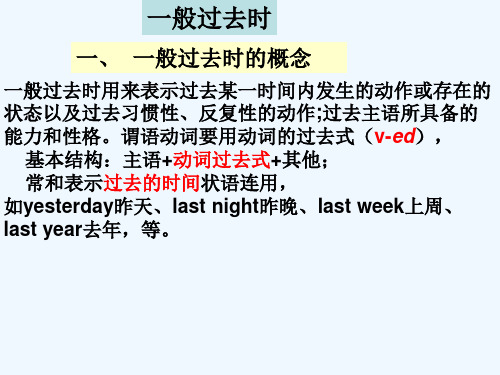
一、 一般过去时的概念
一般过去时用来表示过去某一时间内发生的动作或存在的 状态以及过去习惯性、反复性的动作;过去主语所具备的 能力和性格。谓语动词要用动词的过去式(v-ed),
基本结构:主语+动词过去式+其他; 常和表示过去的时间状语连用, 如yesterday昨天、last night昨晚、last week上周、 last year去年,等。
4.特殊疑问句式:特殊疑问词+ 一般疑问句? 1)特殊疑问词+was/were+主语+其他? 2)特殊疑问词+情态助动词过去式+主语+v.原形+其他? 3)特殊疑问词+did+主语+v.原形+其他? 1)W__h_y_ w__a_s_he late for school last Monday?
他上周一为什么上学迟到了? 2)W_2_0h_年a_t前_ c_她o__u能_ld做__什sh么e ?_d_o__twenty years ago? 3)W_h_e_r_e_ __d_id__you__g_o__ yesterday?昨天你去哪了?
2.Tom and Peter were at home last night. Tom and Peter weren't at home last night. Were Tom and Peter at home last night? Yes, they were./No.they weren't. Where were Tom and Peter last night.
把下列句子变成否定句,一般疑问句,肯否回答及对划线部分提问
1.The air was clean yesterday. The air wasn't clean yesterday. Was the air clean yesterday? Yes, it was./ No,it wasn't. How was the air yesterday?
七年级下英语语法专题:一般过去时
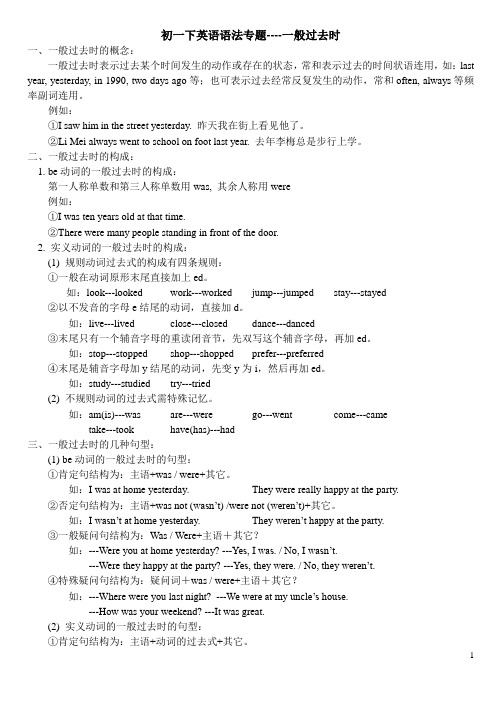
初一下英语语法专题----一般过去时一、一般过去时的概念:一般过去时表示过去某个时间发生的动作或存在的状态,常和表示过去的时间状语连用,如:last year, yesterday, in 1990, two days ago等;也可表示过去经常反复发生的动作,常和often, always等频率副词连用。
例如:①I saw him in the street yesterday. 昨天我在街上看见他了。
②Li Mei always went to school on foot last year. 去年李梅总是步行上学。
二、一般过去时的构成:1. be动词的一般过去时的构成:第一人称单数和第三人称单数用was, 其余人称用were例如:①I was ten years old at that time.②There were many people standing in front of the door.2. 实义动词的一般过去时的构成:(1) 规则动词过去式的构成有四条规则:①一般在动词原形末尾直接加上ed。
如:look---looked work---worked jump---jumped stay---stayed②以不发音的字母e结尾的动词,直接加d。
如:live---lived close---closed dance---danced③末尾只有一个辅音字母的重读闭音节,先双写这个辅音字母,再加ed。
如:stop---stopped shop---shopped prefer---preferred④末尾是辅音字母加y结尾的动词,先变y为i,然后再加ed。
如:study---studied try---tried(2) 不规则动词的过去式需特殊记忆。
如:am(is)---was are---were go---went come---cametake---took have(has)---had三、一般过去时的几种句型:(1) be动词的一般过去时的句型:①肯定句结构为:主语+was / were+其它。
七下(7---12)语法一般过去时
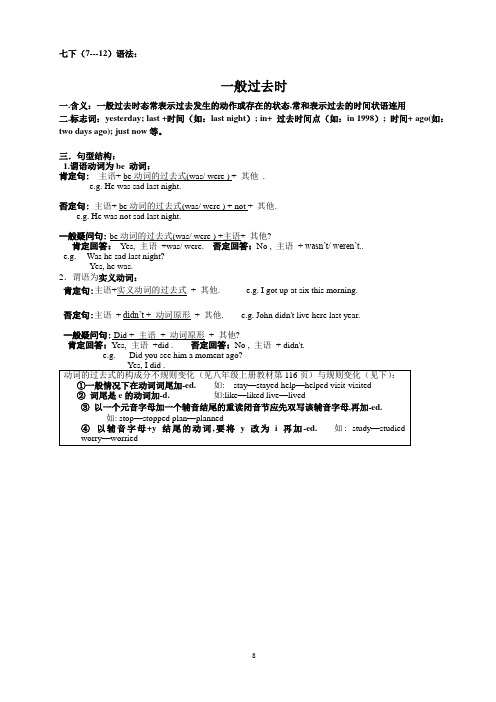
七下(7---12)语法:
一般过去时
一.含义:一般过去时态常表示过去发生的动作或存在的状态,常和表示过去的时间状语连用
二.标志词:yesterday; last +时间(如:last night); in+ 过去时间点(如:in 1998); 时间+ ago(如:two days ago); just now等。
三.句型结构:
1.谓语动词为be 动词:
肯定句: 主语+ be动词的过去式(was/ were ) + 其他.
e.g. He was sad last night.
否定句: 主语+ be动词的过去式(was/ were ) + not + 其他.
e.g. He was not sad last night.
一般疑问句: be动词的过去式(was/ were ) +主语+ 其他?
肯定回答:Yes, 主语+was/ were. 否定回答:No , 主语+ wasn’t/ weren’t..
e.g. ---Was he sad last night?
---Yes, he was.
2.谓语为实义动词:
肯定句:主语+实义动词的过去式+ 其他. e.g. I got up at six this morning.
否定句:主语+ didn’t + 动词原形+ 其他. e.g. John didn't live here last year.
一般疑问句: Did + 主语+ 动词原形+ 其他?
肯定回答:Yes, 主语+did . 否定回答:No , 主语+ didn't.
e.g. ----Did you see him a moment ago?
8。
(完整)初一下英语一般过去时
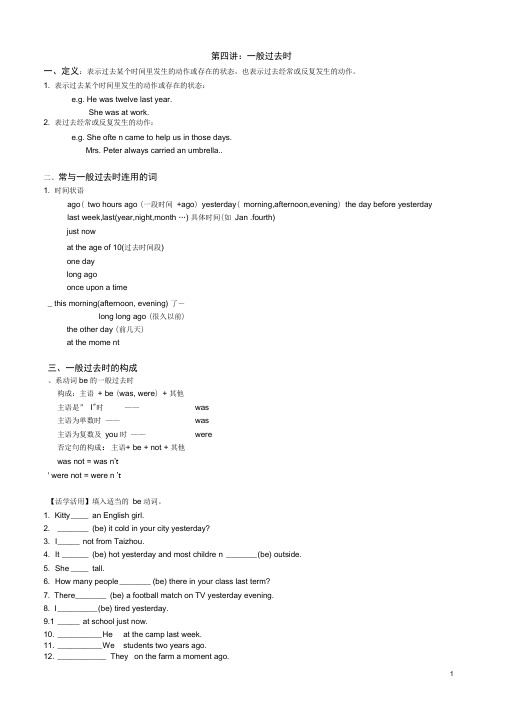
第四讲:一般过去时一、定义:表示过去某个时间里发生的动作或存在的状态,也表示过去经常或反复发生的动作。
1. 表示过去某个时间里发生的动作或存在的状态:e.g. He was twelve last year.She was at work.2. 表过去经常或反复发生的动作:e.g. She ofte n came to help us in those days.Mrs. Peter always carried an umbrella..二、常与一般过去时连用的词1. 时间状语ago( two hours ago (一段时间+ago) yesterday( morning,afternoon,evening) the day before yesterday last week,last(year,night,month …) 具体时间(如Jan .fourth)just nowat the age of 10(过去时间段)one daylong agoonce upon a time_ this morning(afternoon, evening) 了―long long ago (很久以前)the other day (前几天)at the mome nt三、一般过去时的构成、系动词be的一般过去时构成:主语+ be (was, were) + 其他主语是” I"时——was主语为单数时——was主语为复数及you时——were否定句的构成:主语+ be + not + 其他was not = was n't' were not = were n 't【活学活用】填入适当的be动词。
1. Kitty ____ an English girl.2. _______ (be) it cold in your city yesterday?3. I _____ not from Taizhou.4. It ______ (be) hot yesterday and most childre n _______ (be) outside.5. She ____ tall.6. How many people _______ (be) there in your class last term?7. There _______ (be) a football match on TV yesterday evening.8. I _________ (be) tired yesterday.9.1 _____ at school just now.10. __________ H e at the camp last week.11. __________ W e students two years ago.12. ___________ They on the farm a moment ago.13. _______________ Yang Ling eleven years old last year.14. ___________ There an apple on the plate yesterday.15. ___________ There some milk in the fridge on Sunday.2、情态动词的一般过去时构成:主语+ 情态动词+ 动词原形+其他She had to do her homework yesterday. 注意:情态动词后的动词一定要用原形,而且只能是情态动词的过去式。
七年级下一般过去时语法专项
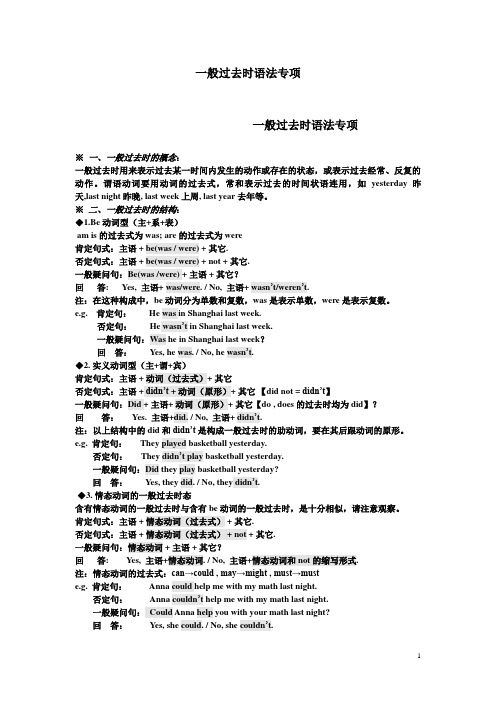
一般过去时语法专项一般过去时语法专项※一、一般过去时的概念:一般过去时用来表示过去某一时间内发生的动作或存在的状态,或表示过去经常、反复的动作。
谓语动词要用动词的过去式,常和表示过去的时间状语连用,如yesterday昨天,last night昨晚, last week上周, last year去年等。
※二、一般过去时的结构:◆1.Be动词型(主+系+表)am is 的过去式为was; are的过去式为were肯定句式:主语 + be(was / were) + 其它.否定句式:主语 + be(was / were) + not + 其它.一般疑问句:Be(was /were) + 主语 + 其它?回答: Yes, 主语+ was/were. / No, 主语+ wasn’t/weren’t.注:在这种构成中,be动词分为单数和复数,was是表示单数,were是表示复数。
e.g. 肯定句:He was in Shanghai last week.否定句:He wasn’t in Shanghai last week.一般疑问句:Was he in Shanghai last week?回答:Y es, he was. / No, he wasn’t.◆2. 实义动词型(主+谓+宾)肯定句式:主语 + 动词(过去式)+ 其它否定句式:主语 + didn’t + 动词(原形)+ 其它【did not = didn’t】一般疑问句:Did + 主语+ 动词(原形)+ 其它【do , does的过去时均为did】?回答:Yes. 主语+did. / No, 主语+ didn’t.注:以上结构中的did和didn’t是构成一般过去时的助动词,要在其后跟动词的原形。
e.g. 肯定句:They played basketball yesterday.否定句:They didn’t play basketball yesterday.一般疑问句:Did they play basketball yesterday?回答:Y es, they did. / No, they didn’t.◆3. 情态动词的一般过去时态含有情态动词的一般过去时与含有be动词的一般过去时,是十分相似,请注意观察。
- 1、下载文档前请自行甄别文档内容的完整性,平台不提供额外的编辑、内容补充、找答案等附加服务。
- 2、"仅部分预览"的文档,不可在线预览部分如存在完整性等问题,可反馈申请退款(可完整预览的文档不适用该条件!)。
- 3、如文档侵犯您的权益,请联系客服反馈,我们会尽快为您处理(人工客服工作时间:9:00-18:30)。
初一下英语语法专题----一般过去时一、一般过去时的概念:一般过去时表示过去某个时间发生的动作或存在的状态,常和表示过去的时间状语连用,如:last year, yesterday, in 1990, two days ago等;也可表示过去经常反复发生的动作,常和often, always等频率副词连用。
例如:①I saw him in the street yesterday. 昨天我在街上看见他了。
②Li Mei always went to school on foot last year. 去年梅总是步行上学。
二、一般过去时的构成:1. be动词的一般过去时的构成:第一人称单数和第三人称单数用was, 其余人称用were例如:①I was ten years old at that time.②There were many people standing in front of the door.2. 实义动词的一般过去时的构成:(1) 规则动词过去式的构成有四条规则:①一般在动词原形末尾直接加上ed。
如:look---looked work---worked jump---jumped stay---stayed②以不发音的字母e结尾的动词,直接加d。
如:live---lived close---closed dance---danced③末尾只有一个辅音字母的重读闭音节,先双写这个辅音字母,再加ed。
如:stop---stopped shop---shopped prefer---preferred④末尾是辅音字母加y结尾的动词,先变y为i,然后再加ed。
如:study---studied try---tried(2) 不规则动词的过去式需特殊记忆。
如:am(is)---was are---were go---went come---came take---took have(has)---had三、一般过去时的几种句型:(1) be动词的一般过去时的句型:①肯定句结构为:主语+was / were+其它。
如:I was at home yesterday. They were really happy at the party.②否定句结构为:主语+was not (wasn’t) /were not (weren’t)+其它。
如:I wasn’t at home yesterday.They weren’t happy at the party.③一般疑问句结构为:Was / Were+主语+其它?如:---Were you at home yesterday? ---Yes, I was. / No, I wasn’t.---Were they happy at the party? ---Yes, they were. / No, they weren’t.④特殊疑问句结构为:疑问词+was / were+主语+其它?如:---Where were you last night? ---We were at my uncle’s house.---How was your weekend? ---It was great.(2) 实义动词的一般过去时的句型:①肯定句结构为:主语+动词的过去式+其它。
如:He went to the toy store yesterday. W e took some pictures in the park.②否定句结构为:主语+did not (didn’t)+动词原形+其它。
如:He didn't go to the toy store yesterday. We didn’t take any pictures in the park.③一般疑问句结构为:Did+主语+动词原形+其它?如:---Did you go to Beijing last week? ---Yes, I did. / No, I didn’t.---Did he meet the businessman before? ---No, he didn't. / Yes, he did.④特殊疑问句结构为:疑问词+did+主语+动词原形+其它?如:---What did you do last night? ---I did my homework.---Where did you go last week? ---I went to Shanghai with my parents. Exercises:一、按要求完成下列句子:1. The children are having a good time in the park. (用last Sunday改写)The children _________ a good time in the park_________ _________.st week I read an English book. (改为否定句)Last week I _________ _________an English book.3. There were about nine hundred people at the concert.否定句:____________________________________________一般疑问句:________________________________________对划线部分提问:____________________________________4.There was only one problem.否定句:____________________________________________一般疑问句:________________________________________对划线部分提问:____________________________________5.Ann did her homework yesterday evening.否定句:____________________________________________一般疑问句:________________________________________对划线部分提问:____________________________________6.My brother was in the park just now.否定句:____________________________________________一般疑问句:________________________________________对划线部分提问:____________________________________7.She had some bread for lunch today.否定句:____________________________________________一般疑问句:________________________________________对划线部分提问:____________________________________二、翻译下列句子,每空一词:1. 我过了一个忙碌但却刺激的周末。
I __________ __________ __________ __________ __________ weekend.2. Jenny喜欢看书。
昨晚她看了一本地理方面的书。
Jenny __________ __________ __________. She _________ a book _________ _________ last night.3. Emma每天都练习弹吉他。
可是昨天她没有练习。
她为数学考试作准备了。
Emma _________ the guitar every day. But she__________ __________ yesterday. She_________ _________ the math test.4. 上周六他们做什么了?他们做作业和购物了。
What __________ they __________ __________ Saturday?They __________ __________ homework and __________ __________ __________.三、选择下列单词,并用其正确形式填空。
clean; die; enjoy; finish; happen; open; rain; start; stay; want1. I my teeth three times yesterday.2. It was hot in the room, so I the window.3. The concert at 7:30 and at 10 o’clock.4. When I was a child, I to be a doctor.5. The accident last Sunday afternoon.6. It’s a nice day today but yesterday it all day.7. We our holiday last year. We at a very nice place.8. Ann’s grandfather when he was 90 years old.四、用动词的适当形式填空:1. I _________ (have) an exciting party last weekend.2. _________ she _________ (practice) her guitar yesterday? No, she ________.3. ---What ________ Tom ________ (do) last Saturday evening?---He ________ (watch) TV and __________ (read) an interesting book.4. They all __________ (go) to the mountains yesterday morning.5. She _________ (not visit) her aunt last weekend. She ________ (stay) at home and _________ (do) some ___________ (clean).6. When _________ you _________ (write) this song? I _________ (write) it last year.7. Carol ___________ (study) for the math test and __________ (practice) English last night.8. ---__________ Mr. Li __________ (do) the project last Monday morning? ---Yes, he _______.9. ---How _________ (be) Jim’s weekend? ---It _________ (be not) bad.10. ---___________ (be) your mother a sales assistant last year? ---No, she __________.11.There ___________ (be) only one tall building here now.12.My aunt ___________ (travel) a lot every year.13.The man ___________ (have) three horses, but now he ___________ (have) only two.14.When the students ___________ (learn) the good news, they ___________ (be) proud ofthemselves.15.Dick ___________ (jump) into a large hole as soon as he ___________ (see) the bear.16.I don’t know why they ___________ (not go) to the movies last night.17.Tom ___________ (fail) in the exam. He ___________ (look) upset now.18.The teacher ___________ (be) pl eased with the boy’s school work just now.19.Alice ___________ (show) her uncle around the new neighborhood last Monday.20.He ___________ (join) the army at the age of eighteen.21.Tom and Mary ___________ (come) to China last month.22.Mike ____________ (not go) to bed until 12 o’clock last night.23.Mary __________ (read) English every morning.24.I ___________ (listen) but ___________ (hear) nothing.25.Tom ___________ (begin) to learn Chinese when he ___________ (be) two.26.She ___________ (watch) TV every evening, but she ___________ (not watch) TV last night.27._________ your father __________ ( go ) to work every day last year?28.What __________ (make) him ___________ (cry) just now?st year the teacher ___________ (tell) us that the earth __________ (move) around thesun.30.There ____________ (be) enough milk at home last week, ___________ (be not) there?。
